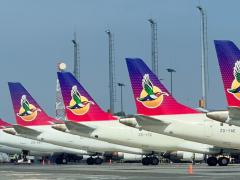SHOCKWAVES from the drastic
weakening of the rand in recent weeks
are yet to be felt in the travel industry –
and tour operators with risky business
practices are likely to be hardest hit,
industry experts say.
When you consider how much money
tour operators receive in advance –
and the fact that the weak rand has
weakened further – it is likely some
tour operators are currently sitting
in a bad position, says Terry Munro,
md of Beachcomber Tours, especially
when you consider the history of tour
operators that have failed under similar
circumstances.
Terry is referring to the practice
whereby some tour operators hold the
money that clients have paid them
rather than paying it directly to
suppliers, using the cash to
earn interest. These operators
then run into cash flow issues
when the rand weakens
significantly.
The bad news for consumers
is that should a tour operator
suddenly be forced to close
its doors as a result of
mismanaged cash flow, leaving
the traveller out of pocket,
travel insurance will not offer
the traveller protection. Simmy
Micheli, sales and marketing
manager of Travel Insurance
Consultants (TIC), says that
while most South African travel
insurance products contain
a Travel Supplier Insolvency
Benefit, to the best of her
knowledge there are none that
include tour operators in the
definition of suppliers.
Proving that a tour operator’s
risky trading practice is fraud
could also be a challenge.
Partner at Hogan Lovells
South Africa, Gareth Cremen,
says fraud is defined as
trading “with the intention
to defraud a party”. He says
that the facts of each case
will differ but simply put if
an operator closed its doors
on a Monday and was still
accepting clients’ money on a
Friday, it would be considered
fraud. The affected party
would, however, need to be
able to build a case history in
order to lay a claim.
Gareth warns that where
agents may need to be
particularly wary is when
they have been involved in a
contractual relationship, which
in fact makes them liable. “If
a travel agent continues to
use a tour operator knowing
there is financial distress
involved, they could also be
liable.”
There are a number of
checks agents can put in
place in order to mitigate the
risk of falling victim to fraud,
says Terry. Asata membership
offers some protection as it
proves that for the last 18
months the operator has
been solvent; however agents
should establish whether an
operator has a history of good
business, he says.
“Agents have the right to
investigate the tour operator
in question before they hand
over their client’s money,”
agrees John Ridler, PR and
media manager of Thompsons
Holidays. He recommends
agents ask the operator to
provide them with letters of
reference from some of their
suppliers and airlines, and
even their bank.
If one understands how
the operator’s finances work
and whether they are quoted
primarily in dollars or euros,
this could also help, Terry
says, as operators who deal
primarily with rands are not
a risk when it comes to the
volatile exchange rate.












